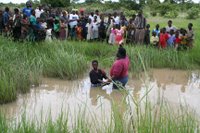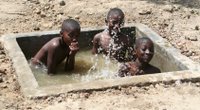“Communication and transportation. Those are the hurdles to face.” A former missionary told me this several years ago. His words rang true all weekend.
Christopher Siatwiko and Jerrie Sichimwa work with several small congregations in the area. They came to us over a month ago and asked David and me to come to Kalundu to conduct an area-wide workshop for Bible school teachers. David was already booked to do medical mission follow-up for the next few weekends, but I offered to come out on Saturday, September 24, and do a two-hour session from 10:00 to 12:00 if I could arrange transportation. Jerrie assured me that Kalundu was not far from where we had done an earlier meeting at Sianongombe, an hour’s drive from Namwianga.
I talked with Bart Bruington who agreed that he would either take me there or let me use his Land Rover for that day. Christopher asked to borrow our bicycle so that he could “organize” the meeting by contacting all the congregations in the area and inviting them. Transportation and communication seemed to be handled.
I should have known better. I knew Christopher’s English was not great, but I thought Jerrie had gotten the message. Christopher and Jerrie showed up on Tuesday before the workshop and presented a letter from the Kalundu church leader. The letter was addressed to Brother Gregersen and Linda and stated that they were looking forward to both of us being with them for Saturday AND Sunday, September 24 and 25. Apparently as Christopher “organized,” he had expanded a two-hour teacher workshop into a two-day meeting with a teacher workshop as one part. I carefully tried to explain that David would NOT be going at all, and that I had only planned to teach on Saturday for two hours. Christopher smiled blankly. Jerrie and Christopher were committed for the two days and I was their transportation out there and back. Couldn’t I help?
I crumbled. I agreed to do the teacher workshop and one women’s class on Saturday. I would come back again on Sunday to teach the children IF I could arrange for a vehicle. I also offered to bring a singing group from the college for Sunday’s service.
In the meantime, Bart’s Land Rover had broken down and couldn’t be repaired until some parts were located. David was taking our Land Rover north to Sicikwalula for a three-day meeting there. I went to Mr. Limba at the Namwianga motor pool and asked if there was a school vehicle and driver available. He assured me that there was a “small van” available and that Donald could drive. The only problem was that the van had no shock absorbers. I asked him how many the van would hold, and he recommended “not more than 10 or 11 since it doesn’t have shocks.” I calculated the numbers I’d have for each trip and thought I was okay.
On Friday morning, things began to get complicated. David was sick in bed with a high fever from strep throat. Donald couldn’t drive, it seems, because he was officiating at a soccer tournament, and no other drivers were available. Mr. Limba said, “No problem, Linda. I’ve seen you drive the Land Rover. You can drive the van.” Hmm. I’d be okay going out there, because Christopher and Jerrie would know the way. But they were staying overnight, so coming back on Saturday afternoon I’d be by myself. I had visions of being lost in the bush, and I remembered the hours by the roadside when we were stranded at Munali Hill with a breakdown. David from his sickbed said absolutely not. I’d have to find someone to go out there and back with me on Saturday.
I was headed into Kalomo about that time when I met Donald on the road. We stopped to visit. He was sorry he couldn’t go, he said, and he offered to contact Mr. Limba about getting someone to accompany me. “How bad is it to drive the vehicle without shocks?” I asked him.
“Oh, it’s not too bad. It’s this one I’m driving here,” he said, and he patted the side of a SINGLE CAB pickup with a camper shell. It seems that Mr. Limba’s idea of a “van” and my idea of a “van” were very different! Most of the “10 or 11” people that Mr. Limba referred to would be riding in the back bed of the pickup.
Soon after I got back from town, Mr. Kunda, a college student, and Maria, a primary teacher, appeared at my door. They would be happy to accompany me on Saturday. Mr. Kunda assured me that he could change a flat tire if necessary, and that he would be able to help me find the way back. Maria just wanted to go along. We were set.
Since David was sick, he wasn’t going to Sicikwalula after all. Bart Bruington would be taking our Land Rover there on Sunday to speak in David’s place, but I could have the Rover for Saturday. At least one of the two trips to Kalundu would be with shock absorbers and real seats!
Jerrie had assured me the trip wouldn’t take more than two hours. Mr. Kunda, Maria, and I set out at 7:30 on Saturday morning. We stopped in Kalomo to pick up Christopher. His wife and aunt, he said, would be joining us “along the way.” We stopped for Jerrie at another village and then turned onto the Kabanga Road.
The Kabanga Road is miles and miles of bone-jarring, teeth-chattering, conversation-stopping washboard. It is the road by which all other roads around Namwianga are evaluated. “Is it as bad as the Kabanga Road?” is the question to ask about any unfamiliar roadway. My hands vibrated on the steering wheel as we jolted along for the first seventeen miles.
Then we turned off the “main” road onto another dirt road. This one was not too bad, but we did have to watch for huge potholes. A few miles later we turned onto an even smaller dirt road and slowed to a crawl. Eventually we crested a hill and headed down into a steep ravine. I held my breath as we approached the bottom and faced the 45-degree slope of the road leading out. “Mr, Kunda, do you know how to set the vehicle for four-wheel drive?” I gasped. He looked down at the knob tentatively and advised, “Just try it in first gear.” I shifted down, gripped the steering wheel, and gunned the accelerator. The Rover lurched up the side of the ravine. My white knuckles relaxed, and I began to breathe normally again.
We stopped to pick up Christopher’s wife, his aunt, and his baby (another surprise). The rest of the almost THREE-hour trip was more of the same: bad roads, potholes, and ravines. For the final mile we drove on a single-lane cow path. Mr. Kunda and I agreed: the school “van” would never have made it.
We climbed out of the Land Rover at Kalundu and were greeted by the church leaders who asked, “Where is Mr. Gregersen?” I looked at Christopher, and again he smiled blankly. The leaders held some whispered conferences to rearrange their plans. They decided to wait for a few more people to arrive before we began the teacher training. I would go ahead and teach the women’s class while Mr. Kunda taught the men. Maria was assigned to take the children and teach them.
We did those classes and then gathered back together for singing. The day wore on. At 1:15 I finally told Jerrie that I had to go ahead and do the teachers’ workshop so I could get home before dark. The men left for a leadership class with Mr. Kunda, and I did the teacher training. The women were excited and responsive about the ideas I shared. They willingly pretended to be children as we did some sample lessons together. When I finished and sat down, several of them took turns thanking me and begging me to come back again.
We ate the customary meal of nshima, chicken, and greens. I tried not to rush, but the minutes were ticking away. At last we said our goodbyes. I warned Jerrie and Christopher that I didn’t know whether or not I could come back on Sunday. It would all depend on whether I could find another vehicle for Bart to take to Sicikwalula. If I couldn’t, then Christopher and Jerrie would have to stay over on Sunday night and I would come back for them on Monday morning. I left extra food for them, and the rest of us set off for another bone-jarring ride back to Namwianga.
We made it home before dark with time to spare. I was relieved to find David feeling better. Bart tried to borrow a vehicle for his trip so I could use the Land Rover on Sunday, but there was none to be had. As I write this on Saturday night, Jerrie and Christopher are stuck at Kalundu until David and I can get back out there. I can’t tell them that, since Kalundu is far out of cell phone range. They’ll figure it out when I don’t show up on Sunday.
It’s all about transportation and communication.













